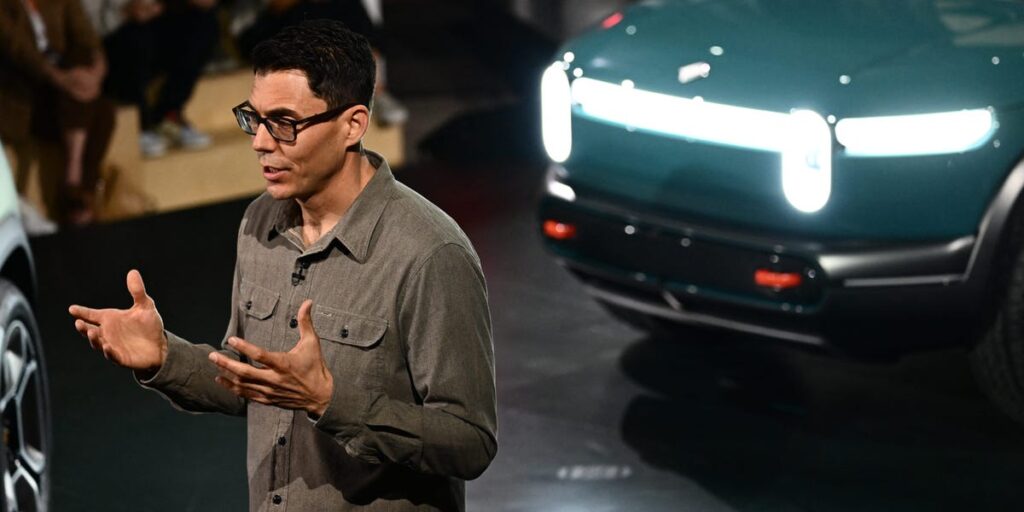- Rivian CEO RJ Scaringe addressed weak guidance for 2025, citing uncertainty.
- Scaringe said tariffs and EV credit removal could impact pricing and the shift to electrification.
- President Donald Trump has threatened tariffs on Canada and Mexico.
Despite beating expectations with its fourth-quarter earnings release on Thursday, Rivian offered weak guidance for 2025 — and that’s because of looming tariffs on automakers and eliminating EV credits.
“There’s certainly a lot of uncertainty,” Rivian CEO RJ Scaringe said in a CNBC interview published Thursday.
Scaringe said the company’s 2025 outlook provides a “comprehensive view” of what could happen regarding tariffs and consumer incentives for purchasing EVs. He said tariffs and the removal of consumer incentives like the tax credit for new EVs “both ultimately have very similar effects.”
The EV company released its fourth-quarter earnings report on Thursday, doubling Wall Street’s expectations for gross profit with a reported $170 million. It also outperformed forecasts in earnings per share and revenue.
However, its 2025 guidance fell short with projections of vehicle deliveries between 46,000 and 51,000. The high end of that estimate falls below Rivian’s 2024 total deliveries of 52,000 EVs, and the midpoint of the range also misses Wall Street’s estimate of about 55,000 vehicles.
In a previous interview with Business Insider, Scaringe shrugged off President Donald Trump’s planned rollback of EV incentives, including the $7,500 tax incentive for EV purchases. He said although the EV industry faced a “high degree of uncertainty” in the next few years, Trump’s plans to eliminate parts of the Biden administration’s Inflation Reduction Act were “less impactful than people believe.”
“I don’t think removing a $7,500 credit is going to change the end state,” he told BI. “The end state’s still clear. It’s still going to be electric.”
Scaringe reaffirmed in the Thursday interview that his view that “the entirety of the automotive world is going to convert to electric” hasn’t changed. The rate of that is still a question mark, though, and depends on how quickly the industry can create options for consumers.
Tariffs might not help either.
Trump shared plans on Tuesday to impose auto tariffs of around 25%. He’s also threatened tariffs on imported goods from Canada and Mexico, which some analysts said could add an average of $2,700 to new car prices in the US.
While Rivian assembles its vehicles in the US, Scaringe said a number of tier 2 and tier 3 suppliers exist outside the country, and higher costs due to tariffs will “translate into pricing.” Removing tax credits, which help make vehicles more affordable, would have a similar effect on pricing, Scaringe said.
“In both cases, they ultimately are going to impact a man and they ultimately are going to impact the rate at which consumers, you know, shift towards electrification,” Scaringe said.
Scaringe said that the company is focusing on factors in its control, like cost efficiency, software improvements, and production of R2, which is set to launch in the first half of next year.
“We’re certainly building, you know, building the resilience to respond to whatever ultimately happens in terms of trade policy and consumer credits,” Scaringe said in the interview.
Rivian did not immediately respond to a request for comment from Business Insider.
Read the full article here
















